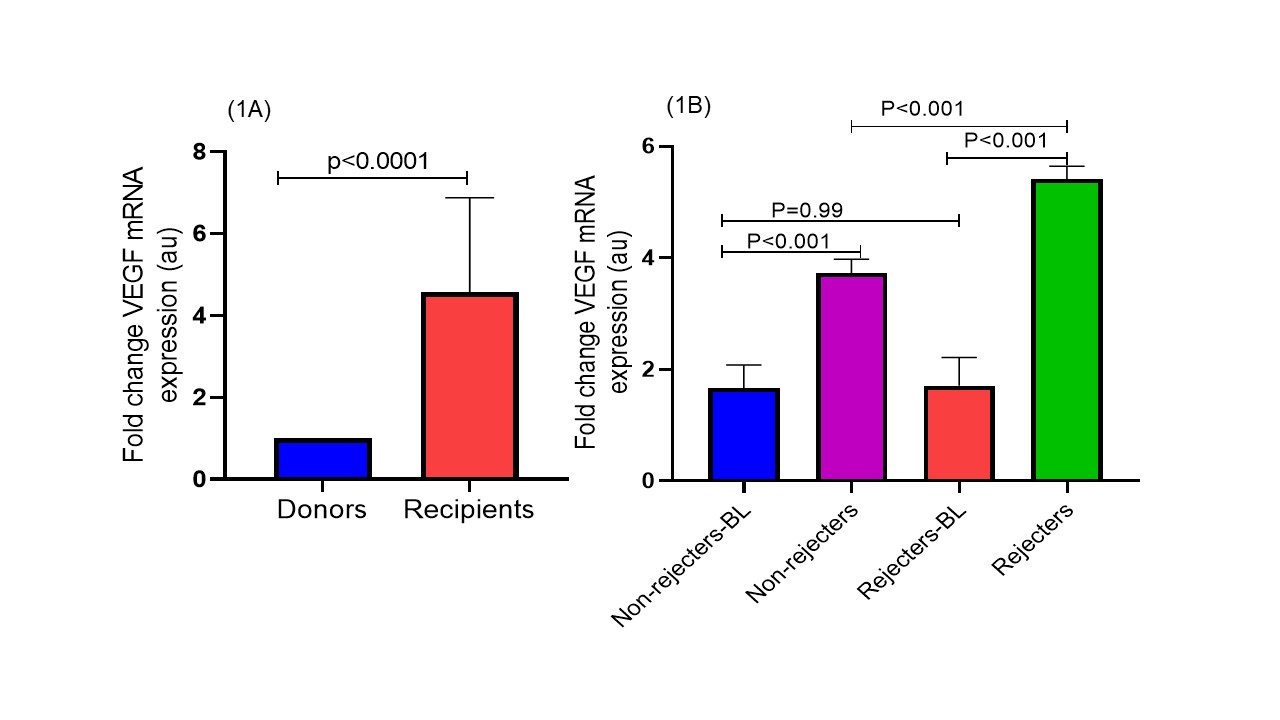Association of donor vascular endothelial growth factor gene polymorphisms with risk of acute kidney allograft rejection
Brijesh Yadav1, Narayan Prasad1, Ravi Shankar Kushwaha1, Vinita Agrawal2, Ranjeet Chauhan1, Mansi Bhatt1.
1Nephrology and Renal Transplantation, Sanjay Gandhi Postgraduate Institute of Medical Sciences, , Lucknow, India; 2Pathology, Sanjay Gandhi Postgraduate Institute of Medical Sciences, Lucknow, India
Narayan Prasad.
Introduction: Vascular endothelial growth factor (VEGF) is an essential angiogenic and vasculogenic growth factor which regulates the de-novo vasculogenesis, angiogenesis, vasodilation, vascular permeability, and chemotactic infiltrations of immune cells in tissues. Recipients' single-nucleotide polymorphisms (SNPs) of vascular endothelial growth factors (VEGF) modulate the risk of allograft rejection. However, the association of the donor’s VEGF gene polymorphism with acute rejection remained unelucidated till now. Therefore, we determined the association of donor VEGF polymorphism with the risk of acute allograft rejection.
Methods: In this study, VEGF gene SNPs at nine loci were analyzed in 160 Kidney donors and their recipients with rejection (Rejecters, n=80) and without rejection (non-rejecters, n=80) from a pool of HLA-matched, 1700 renal transplant recipients and donor. The amplification-refractory mutation system (ARMS) genotyping was carried out for VEGF SNPs namely -1154 G>A (rs5742909), --1190 G>A (rs11571317), -1455 T>C (rs16840252), -1499 C>T (rs4553808), -2578 C>A (rs3087243), and -2549 18bp Insertion/Deletion (rs144854329), and PCR-restriction fragment length polymorphism (RFLP) based approach was adopted for -634 C>G (rs231775), +405 C>G (rs2010963) and +936 C>T (rs112005313). VEGF mRNA expression, plasma VEGF level, and intragraft VEGF expression were also analyzed by using RT-PCR, ELISA and immunohistochemistry, respectively.
Results: The mutant genotypes of VEGF -634C>G [GG genotype; P < 0.0001; OR (95% CI) = 17.74 (5.16-60.96)], VEGF -1154 G>A [AG genotype; P < 0.0001; OR (95% CI) = 16.87(3.87-73.55), VEGF +936 C>T [CT genotype; P <0.0001; OR (95% CI) = 178.64 (23.28-1370.9)) & TT genotype; P <0.0001; OR (95% CI) = 3149(278.91-35553) ], VEGF -1455 T>C [CC genotype; P value =0.0464; OR (95% CI) = 3.13 (1.07-9.10)], VEGF -2578 C>A [CA genotype; P=0.0283; OR (95% CI) = 19.0(1.12-321.59), & AA genotype; P value <0.0001; OR (95% CI) = 92.01(5.46-1550.0)], VEGF -2549 18bp Insertion/Deletion [ID genotype; p value <0.0001; OR (95% CI) =27.27(3.61-205.73) & DD genotype; P value <0.0001; OR (95% CI) = 92.01(5.46-1550.0)] were significantly associated with acute kidney allograft rejection risk, whereas mutant genotypes VEGF -1190 G>A [AA genotype; P value <0.0001; OR (95% CI) = 0.03(0.002-0.66)], showed a protective association with acute rejection. The blood VEGF mRNA and plasma VEGF levels were higher in the rejecters group compared to non-rejectors. In rejecter patients, the intragraft VEGF-A protein expression was higher in cortical peritubular capillaries, glomerulus, and medullary capillaries.

Conclusions: Donor VEGF SNPs were significantly associated with acute renal allograft rejection risk.
This study was supported by the extramural grant from Indian Council of Medical Research Grant number: 5/4/7-7/2014/NCD-II.
[1] VEGF, Polymorphism, Acute rejection, Odd ratio
